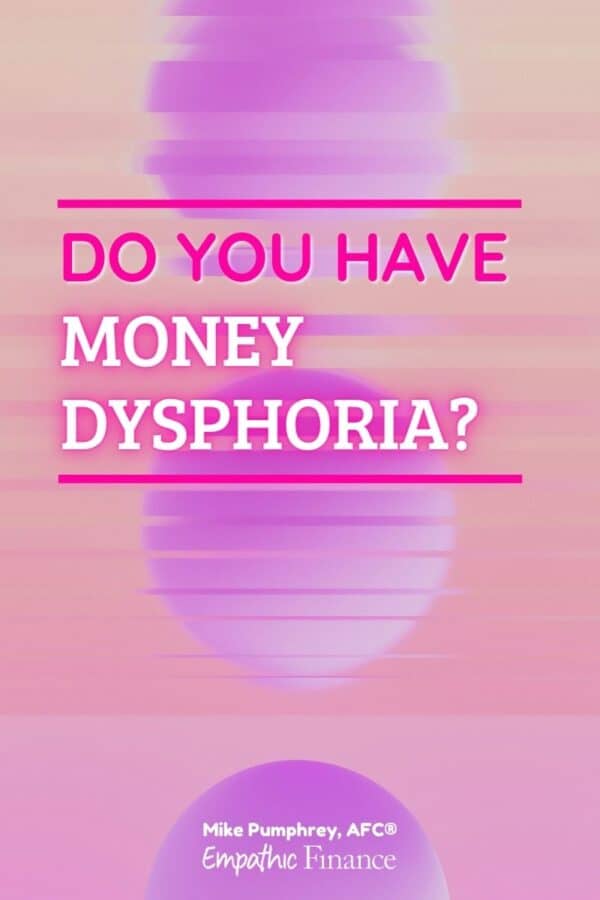I talk about money dysphoria, who it affects, its likely causes, how it manifests itself, and what to do about it.
Dysmorphia is an interesting term. It refers to a belief of something—usually something bad, usually associated with yourself—that does not correspond to widely-accepted reality.
It’s hard to find a straight definition for the word, because it’s so associated with “body dysmorphia”.
What is body dysmorphia? According to the Mayo Clinic, it is a mental health condition where you perceive that there are flaws in your body that cannot be seen by others.
When you have body dysmorphic disorder, you intensely focus on your appearance and body image, repeatedly checking the mirror, grooming or seeking reassurance, sometimes for many hours each day. Your perceived flaw and the repetitive behaviors cause you significant distress and impact your ability to function in your daily life.
This manifests itself in many ways, but often it turns into an obsessive focus on “fixing” the “flaw”, which, being not evident to others, may not ever lead to a satisfactory resolution of the feelings.
Back to the Mayo Clinic, here are some symptoms:
- Engaging in behaviors aimed at fixing or hiding the perceived flaw that are difficult to resist or control, such as frequently checking the mirror, grooming or skin picking
- Attempting to hide perceived flaws with styling, makeup or clothes
- Having perfectionist tendencies
- Seeking cosmetic procedures with little satisfaction
- Avoiding social situations
I have known people with body dysmorphia, and it is a terrible condition to experience.
But I’m here today to look at another dysmorphic condition. Today, I want to bring light to “money dysmorphia”.
Because you may be experiencing it, even if you don’t know it.
Table of Contents
What is money dysphoria?
Money dysphoria is a belief in your financial situation that doesn’t match reality.
This can work in one of two directions: you think your finances are worse than what they truly are, and you think your finances are better than what they truly are.
And just like body dysmorphia, this can affect your behavior and your mental health in a number of different ways.
How money dysphoria shows itself
In order to account for the different ways that money dysmorphia exhibits its tendencies, it might be helpful to distinguish the different types. Let’s use the phrases “positive dysmorphia” to denote a situation that feels better than it actually is and “negative dysmorphia” to denote a situation that feels worse than it actually is.
For positive money dysmorphia, since you feel like your financial situation is on better footing than your money might indicate, this might lead you to make more aggressive or reckless choices, such as large purchases or a lack of care in spending.
For negative money dysmorphia, this may exhibit itself as being unwilling to spend money except in the most direst circumstances, and feeling shame and guilt, especially when spending money. You may focus so hard on money that they become obsessive about saving, to the detriment of your mental health.
You can probably guess which one is more common.
Who has money dysmorphia?
A survey in 2024 conducted by Credit Karma found that 43% of Gen Z and 41% of millennials experience money dysmorphia.
No word on the Gen X or boomers, but one can imagine that this isn’t limited to those under 45.
In the survey, of those who said that they experience money dysmorphia, 82% say they feel behind on their finances.
That’s not surprising to me, as I imagine that most people are going to experience negative money dysmorphia.
Why money dysmorphia can happen
The survey posits that this condition is related to “keeping up with the Joneses”. Or rather, the comparisons that people make when they see others flaunting wealth, which is so easy to do through social media.
Your Instagram feed is likely full of beautiful, successful people, wearing expensive clothes, lounging on foreign beaches: in short, living the life you wish you lived. Is it any wonder that people feel like they’re not doing all that well, financially?
But this does seem like as good a time as any to remind everyone that when you compare yourself to someone you see on the internet, you are comparing your internal experience with their external presentation. And those things are never comparable.
And in fact, when it comes to financial presentations, it’s totally easy to make it look like you’re wealthy. Credit cards will be willing to lend you as much money as you want. Buy Now Pay Later services let you get the thing today, whatever that thing is. Filters and intentional photo selection, and now even AI can make people look like they are living the life that they can’t actually afford.
How to stop money dysmorphia
The way to put an end to money dysmorphia depends on what your particular hang-up is.
If you’re worried that other people are more successful than you, it might be worth it to ask yourself what it is about that that matters so much to you. I mean, with income inequality being what it is, there is always going to be people who have orders of magnitude more financial success than you. That’s not a reflection on you at all.
But in these situations, whether you have positive or negative money dysphoria, I think one of the first steps is to stop looking outward and start looking inward. And by that I mean, to truly understand your own financial situation.
Most people have no idea what they spend. They “feel” like they spend too much, but they can’t put any numbers on it. That’s not helpful.
So I always recommend that you start tracking your spending and understanding what it is that you spend money on.
Then it’s worth looking at whether you’re spending more money than you make. That’s an easy trap to get into if you put everything on a credit card. But you can’t get into credit card debt if you don’t use credit cards. Just something to think about.
It’s also important to figure out what your financial goals are. Rather than trying to compare yourself to someone else’s curated life online, what do you want your life to look like? I believe that it’s important to have a limited number of goals (three, optimally) to make sure that you make progress towards them and don’t spin your wheels unnecessarily.
You can beat money dysphoria
If you think you have money dysphoria, don’t worry, it’s not a life sentence. But for the sake of your mental health and those around you, I want you to get help. If you’re not in therapy, that’s always a good place to start, but beyond that, really taking a look at your situation and gaining more clarity as to where you truly are is a good place to start.
You can’t hide from reality forever, and luckily, it’s probably not as bad as you fear.



